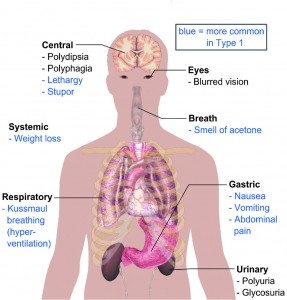 There are several ways to diagnose diabetes. Each way usually needs to be repeated on a second day to diagnose diabetes.
There are several ways to diagnose diabetes. Each way usually needs to be repeated on a second day to diagnose diabetes.
Testing should be carried out in a health care setting (such as your doctor’s office or a lab). If your doctor determines that your blood glucose level is very high, or if you have classic symptoms of high blood glucose in addition to one positive test, your doctor may not require a second test to diagnose diabetes.
A1C
The A1CX test measures your average blood glucose for the past 2 to 3 months. The advantages of being diagnosed this way are that you don’t have to fast or drink anything.
• Diabetes is diagnosed at an A1C of greater than or equal to 6.5%
Result A1C
Normal less than 5.7%
Prediabetes 5.7% to 6.4%
Diabetes 6.5% or higher
Fasting Plasma Glucose (FPG)
This test checks your fasting blood glucose levels. Fasting means after not having anything to eat or drink (except water) for at least 8 hours before the test. This test is usually done first thing in the morning, before breakfast.
• Diabetes is diagnosed at fasting blood glucose of greater than or equal to 126 mg/dl
Result Fasting Plasma Glucose (FPG)
Normal less than 100 mg/dl
Prediabetes 100 mg/dl to 125 mg/dl
Diabetes 126 mg/dl or higher
Oral Glucose Tolerance Test
(also called the OGTT)
The OGTT is a two-hour test that checks your blood glucose levels before and 2 hours after you drink a special sweet drink. It tells the doctor how your body processes glucose.
• Diabetes is diagnosed at 2 hour blood glucose of greater than or equal to 200 mg/dl
Result Oral Glucose Tolerance Test (OGTT)
Normal less than 140 mg/dl
Prediabetes 140 mg/dl to 199 mg/dl
Diabetes 200 mg/dl or higher
Random (also called Casual)
Plasma Glucose Test
This test is a blood check at any time of the day when you have severe diabetes symptoms.
• Diabetes is diagnosed at blood glucose of greater than or equal to 200 mg/dl
What is Prediabetes?
Before people develop type 2 diabetesX, they almost always have “prediabetes” — blood glucose levels that are higher than normal but not yet high enough to be diagnosed as diabetes.
Doctors sometimes refer to prediabetes as impaired glucose tolerance (IGT) or impaired fasting glucose (IFG), depending on what test was used when it was detected. This condition puts you at a higher risk for developing type 2 diabetes and cardiovascular diseaseX.
No Clear Symptoms
There are no clear symptoms of prediabetes, so, you may have it and not know it.
Some people with prediabetes may have some of the symptoms of diabetes or even problems from diabetes already. You usually find out that you have prediabetes when being tested for diabetes.
If you have prediabetes, you should be checked for type 2 diabetes every one to two years.
Results indicating prediabetes are:
• An A1C of 5.7% – 6.4%
• Fasting blood glucose of 100 – 125 mg/dl
• An OGTT 2 hour blood glucose of 140 mg/dl – 199 mg/dl
Preventing Type 2 Diabetes
You will not develop type 2 diabetes automatically if you have prediabetes. For some people with prediabetes, early treatment can actually return blood glucose levels to the normal range.
Research shows that you can lower your risk for type 2 diabetes by 58% by:
• Losing 7% of your body weight (or 15 pounds if you weigh 200 pounds)
• Exercising moderately (such as brisk walking) 30 minutes a day, five days a week
Don’t worry if you can’t get to your ideal body weight. Losing even 10 to 15 pounds can make a huge difference.
Complications linked to badly controlled diabetes:
Below is a list of possible complications that can be caused by badly controlled diabetes:
• Eye complications – glaucoma, cataracts, diabetic retinopathy, and some others.
• Foot complications – neuropathy, ulcers, and sometimes gangrene which may require that the foot be amputated
• Skin complications – people with diabetes are more susceptible to skin infections and skin disorders
• Heart problems – such as ischemic heart disease, when the blood supply to the heart muscle is diminished
• Hypertension – common in people with diabetes, which can raise the risk of kidney disease, eye problems, heart attack and stroke
• Mental health – uncontrolled diabetes raises the risk of suffering from depression, anxiety and some other mental disorders
• Hearing loss – diabetes patients have a higher risk of developing hearing problems
• Gum disease – there is a much higher prevalence of gum disease among diabetes patients
• Gastroparesis – the muscles of the stomach stop working properly
• Ketoacidosis – a combination of ketosis and acidosis; accumulation of ketone bodies and acidity in the blood.
• Neuropathy – diabetic neuropathy is a type of nerve damage which can lead to several different problems.
• HHNS (Hyperosmolar Hyperglycemic Nonketotic Syndrome) – blood glucose levels shoot up too high, and there are no ketones present in the blood or urine. It is an emergency condition.
• Nephropathy – uncontrolled blood pressure can lead to kidney disease
• PAD (peripheral arterial disease) – symptoms may include pain in the leg, tingling and sometimes problems walking properly
• Stroke – if blood pressure, cholesterol levels, and blood glucose levels are not controlled, the risk of stroke increases significantly
• Erectile dysfunction – male impotence.
• Infections – people with badly controlled diabetes are much more susceptible to infections
• Healing of wounds – cuts and lesions take much longer to heal
Glades Medical Group offers a comprehensive wellness program tailored to fit a full spectrum of individual lifestyles, from age specific care, to gender based treatment needs. We offer highly effective maintenance programs for preventative care to increase vitality, enhance memory, reduce stress, and improve overall quality of life.
Patients from twelve through senior years – focused on acute, chronic care and lifelong management of health and well-being. To speak with one of our doctors contact the Glades Medical team at 561-394-3088.
Provided by the American Diabetic Association – www.Diabetes.org
Check Also
A Guiding Hand: Finding Compassion & Clarity in Life’s Toughest Moments
In life’s most difficult moments, finding a source of strength and guidance is paramount. For …
 South Florida Health and Wellness Magazine Health and Wellness Articles
South Florida Health and Wellness Magazine Health and Wellness Articles




